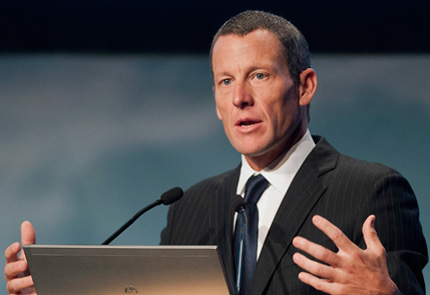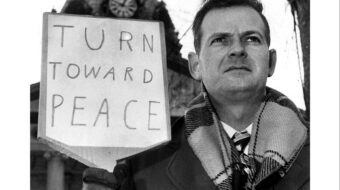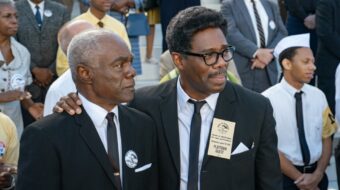
Most Americans would readily admit the “war on drugs” has been a failure. The draconian policies have led to record amounts of arrests, primarily of adult males of color. The resulting felony convictions create a lifelong stigma that limits these individuals’ full participation in their communities and their employment opportunities. People’s constitutional rights are routinely violated through “stop and frisk” or consent searches in traffic stops which often end up targeting ethnic minorities. The “drug war” structure is a reactive program of policies that recognizes it will never be able to “win” but nonetheless demands increasing amounts of funds and legal latitude to combat the perceived evil.
Yet for all of its failures, the “war on drugs” continues. So, it should be no surprise that when the issue of performance-enhancing drugs and blood doping entered the sporting world, the practices of the drug war would follow.
Lance Armstrong‘s lifetime ban over doping allegations and Major League Baseball’s 50-game suspensions of Melky Cabrera and Bartolo Colon for testosterone make them just the latest faces in the sporting version of the “war on drugs.”
From Barry Bonds and Roger Clemens to now, the parallels to the drug war are obvious. Just as arrests for possession have skyrocketed, the sporting drug war also puts a disproportionate amount of focus on individuals. This idea has failed in minimizing recreational drug use. The policy of publicly shaming and putting all responsibility at the feet of the individual player has also failed to limit athletes choosing to take performance-altering drugs (PEDs).
There are no deeper analyses of why people choose to use drugs or how our society can ameliorate the situation. In the sport world, no one asks the institutions, teams and owners to, say, turn over the billions they earned from baseball’s steroid era.
For international cycling, the focus on Lance Armstrong fails to acknowledge that over 40 fellow cyclers who raced along with Armstrong have been implicated in their own scandals.
There is also no investigation of the precariousness of these athletes’ jobs. It is tragically often that athletes are willing to risk everything by using PEDs to ensure as much earning ability as possible. However, owners and institutions that profit off of these athletes’ risks don’t face punishment and can always find new players to take the place of those suspended and disgraced.
Unfortunately, the status quo ultimately refuses to acknowledge the powerful role and culpability of those owners and institutions in benefitting from and shaping the motivations behind individuals’ choices.
Since its inception, the sport “war on drugs” has also mirrored its public policy counterpart in playing fast and loose with constitutional rights.
In 2002, Major League Baseball and its union agreed to confidential testing to see if there was a steroid/PED problem. If a certain percentage of players tested positive, the league would use mandatory testing.
In April 2004, then-IRS agent Jeff Novitzky spearheaded raids on several drug-testing labs and the Bay Area Lab Co-Operative (BALCO) with warrants to get evidence against 10 players whom he was investigating for alleged steroid use. But the federal agents including Novitzky took evidence and samples of over 100 MLB players. They also obtained testing results of a number of unrelated sports, athletes and events.
The 9th Circuit Court of Appeals demanded the return of the illegally seized evidence, and other judges harshly criticized Novitzky’s actions.
Yet, Novitzky was not fired for this assault on the Fourth Amendment. In fact, he was given a job in the Food and Drug Administration. He has also been one of the lead investigators against Barry Bonds, Roger Clemens and Lance Armstrong. He is also involved in the investigation and possible prosecution of Melky Cabrera.
The sporting drug war mirrors its general counterpart in yet another vein. It is a gigantic waste of money.
Countless millions have been spent on enforcement, even while tacitly acknowledging the fact that the newest designer drug will likely be ahead of the tests. The U.S. Anti-Doping Agency even admitted that it would not be able to catch a person if they used blood transfusions.
Instead, the sporting drug war has created a reactive structure that asks for millions in testing and then prosecutions long after the athlete has competed.
Public money and prosecutor time were spent convicting Barry Bonds of obstruction of justice for giving a meandering answer to a grand jury, as well as on the Roger Clemens case which ended in an acquittal. With Lance Armstrong, it ended up that there was not a strong enough case to bring before a jury.
The harsh punishments have not curbed the number of athletes choosing to use performance-enhancing drugs. This is incredibly similar to the way that mandatory minimum sentences and record numbers of arrests have not curbed the appetite for drugs in general.
The definition of insanity is to do the same thing over and over while expecting different results. It is high time that we get a massive change in public policy about the “war on drugs,” in the sports world and in general.
Photo: Cancer survivor Lance Armstrong speaks to delegates at the World Cancer Congress in Montreal Aug. 29. Graham Hughes/The Canadian Press/AP












Comments